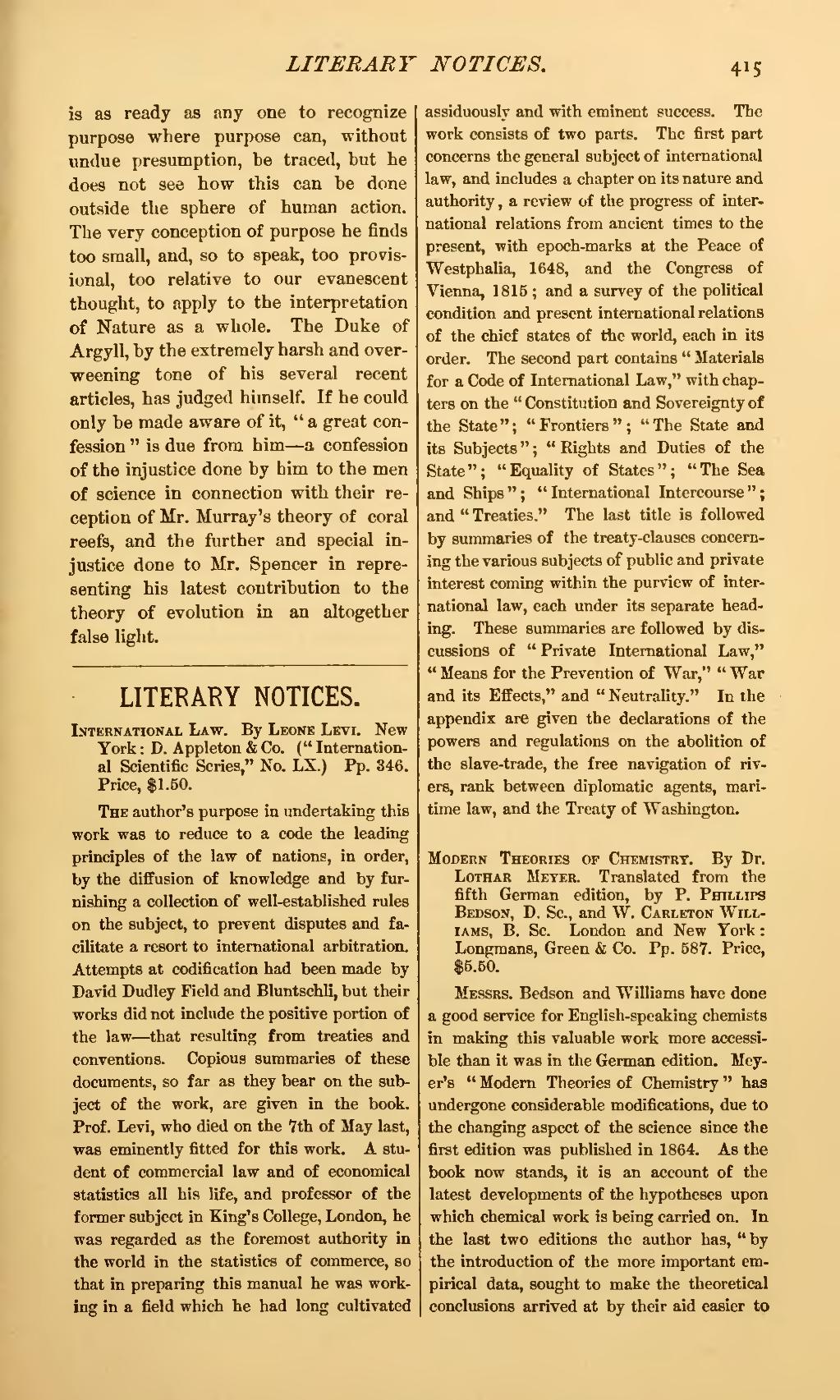is as ready as any one to recognize purpose where purpose can, without undue presumption, be traced, but he does not see how this can be done outside the sphere of human action. The very conception of purpose he finds too small, and, so to speak, too provisional, too relative to our evanescent thought, to apply to the interpretation of Nature as a whole. The Duke of Argyll, by the extremely harsh and overweening tone of his several recent articles, has judged himself. If he could only be made aware of it, "a great confession" is due from him—a confession of the injustice done by him to the men of science in connection with their reception of Mr. Murray's theory of coral reefs, and the further and special injustice done to Mr. Spencer in representing his latest contribution to the theory of evolution in an altogether false light.
International Law. By Leone Levi. New York: D. Appleton & Co. ("International Scientific Series," No. LX.) Pp. 346. Price, $1.60.
The author's purpose in undertaking this work was to reduce to a code the leading principles of the law of nations, in order, by the diffusion of knowledge and by furnishing a collection of well-established rules on the subject, to prevent disputes and facilitate a resort to international arbitration. Attempts at codification had been made by David Dudley Field and Bluntschli, but their works did not include the positive portion of the law—that resulting from treaties and conventions. Copious summaries of these documents, so far as they bear on the subject of the work, are given in the book. Prof. Levi, who died on the 7th of May last, was eminently fitted for this work. A student of commercial law and of economical statistics all his life, and professor of the former subject in King's College, London, he was regarded as the foremost authority in the world in the statistics of commerce, so that in preparing this manual he was working in a field which he had long cultivated assiduously and with eminent success. The work consists of two parts. The first part concerns the general subject of international law, and includes a chapter on its nature and authority , a review of the progress of international relations from ancient times to the present, with epoch-marks at the Peace of Westphalia, 1648, and the Congress of Vienna, 1815; and a survey of the political condition and present international relations of the chief states of the world, each in its order. The second part contains "Materials for a Code of International Law," with chapters on the "Constitution and Sovereignty of the State"; "Frontiers"; "The State and its Subjects"; "Rights and Duties of the State"; "Equality of States"; "The Sea and Ships"; "International Intercourse"; and "Treaties." The last title is followed by summaries of the treaty-clauses concerning the various subjects of public and private interest coming within the purview of international law, each under its separate heading. These summaries are followed by discussions of "Private International Law," "Means for the Prevention of War," "War and its Effects," and "Neutrality." In the appendix are given the declarations of the powers and regulations on the abolition of the slave-trade, the free navigation of rivers, rank between diplomatic agents, maritime law, and the Treaty of Washington.
Modern Theories of Chemistry. By Dr. Lothar Meyer. Translated from the fifth German edition, by P. Phillips Bedson, D.Sc., and W. Carleton Williams, B.Sc. London and New York: Longmans, Green & Co. Pp. 587. Price, $5.50.
Messrs. Bedson and Williams have done a good service for English-speaking chemists in making this valuable work more accessible than it was in the German edition. Meyer's "Modern Theories of Chemistry" has undergone considerable modifications, due to the changing aspect of the science since the first edition was published in 1864. As the book now stands, it is an account of the latest developments of the hypotheses upon which chemical work is being carried on. In the last two editions the author has, "by the introduction of the more important empirical data, sought to make the theoretical conclusions arrived at by their aid easier to

